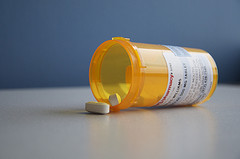Drugs Approved Due To Fraudulent Research Still On Market, FDA Shrugs
This week, ProPublica revealed the results of their investigation into the fraudulent studies of one contract research firm in Texas. Some of the drugs in question are still on the market, but the Food and Drug Administration hasn’t required the companies that sell them to perform new safety and efficacy tests.
What happens when drugs aren’t perfectly bioequivalent? One instructive case is that of budeprion, Teva Pharmaceuticals’ generic version of the antidepressant Wellbutrin XL. When patients complained that the drug wasn’t as effective as the name-brand, the FDA insisted that it was bioequivalent. One patient interviewed by ProPublica blames a seizure on the generic version of the drug, and is suing the company. Neither Teva nor the company that manufactured the pills will admit that they weren’t equivalent, but the FDA pulled that version from the market.
What happens when human studies that measure the levels of a drug in patients’ blood and its safety are falsified, as the FDA alleges happened in Houston? Well…the FDA doesn’t want the public to know, protecting the companies that used the testing firm and the names of the affected drugs as trade secrets. ProPublica was able to turn up a few, which include drugs as mundane as generic ibuprofen, but also anticonvulsant and chemotherapy drugs that require precise dosing. Precise dosing that should be based on solid research, but these drugs remain on the market even without new studies.
FDA Let Drugs Approved on Fraudulent Research Stay on the Market [ProPublica]
No Substitute: When a Generic Drug Isn’t What it Seems [ProPublica]
Want more consumer news? Visit our parent organization, Consumer Reports, for the latest on scams, recalls, and other consumer issues.


